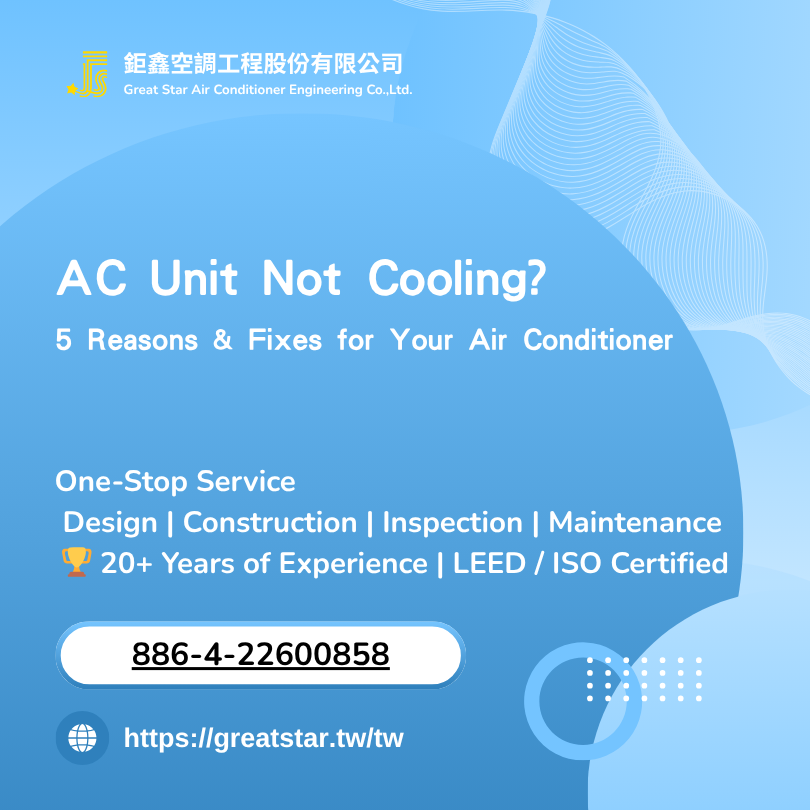最新消息
AC Unit Not Cooling? 5 Reasons & Fixes for Your Air Conditioner

Table of Contents
What is an air conditioning unit?
An air conditioning unit is essentially a system designed to regulate indoor temperature, humidity, and air quality. It works by circulating refrigerant, operating a compressor, and utilizing heat exchange principles to remove heat from indoor air and deliver cooled air, maintaining a stable and comfortable environment. For commercial buildings, technology factories, medical facilities, or warehouse spaces, an air conditioner is an essential infrastructure that not only affects user comfort but also directly impacts productivity and equipment safety.
Typically, air conditioning units consist of two main components: an indoor unit that blows cool air and absorbs heat, and an outdoor unit that expels heat outside. Although the cooling system design may vary slightly between brands and models, the core functionality relies on heat exchange and refrigerant circulation. Choosing the right air conditioner requires consideration of room size, cooling requirements, energy efficiency, and operating costs to achieve long-term comfort and energy savings.
Modern air conditioning units often include smart control systems, allowing precise indoor climate adjustment through timers, temperature settings, or remote monitoring. For businesses and industrial spaces, proper air conditioning management reduces system failure rates, extends unit lifespan, and ensures a stable working or production environment.
How do air conditioning units work?
The core of an air conditioner is its cooling system, which typically consists of a compressor, condenser, expansion valve, and evaporator. The operation works as follows: first, the compressor compresses the refrigerant into a high-pressure, high-temperature gas, which flows through the outdoor condenser to release heat. The refrigerant then passes through the expansion valve, where it drops in pressure and enters the evaporator to absorb heat, cooling the indoor air. The cooled air is then circulated into the room by a fan, creating a comfortable environment.
If your air conditioning unit is running but not cooling, common causes may include low refrigerant, clogged filters, compressor failure, fan issues, or imbalance between indoor and outdoor units. Each issue requires specific maintenance, such as adding refrigerant, cleaning or replacing filters, or repairing the compressor or fan. Regular inspection and maintenance of the cooling system are essential for prolonging the lifespan of your air conditioner and ensuring energy efficiency.
Modern air conditioners can also integrate smart technologies, such as temperature sensors, load sensors, or automatic energy-saving modes, which adjust compressor operation according to indoor load to optimize cooling efficiency. For large commercial buildings or industrial spaces, this smart control not only improves comfort but also reduces energy costs.
What are the different types of AC units?
There are various types of air conditioning units on the market, each with its own advantages and applications:
Window AC Units:Compact, self-contained units installed in windows or walls. Ideal for small offices or residential spaces, they are easy to operate and low-cost but have limited cooling capacity.
Split AC Units:Comprise a separate indoor unit and outdoor unit. Suitable for medium-sized offices or commercial spaces, they offer stable cooling performance and low noise levels.
Central Air Conditioning Units:Centralized systems that distribute cool air through ducts to multiple rooms. Ideal for large buildings, factories, or medical facilities. The central cooling system is highly efficient and allows unified control of temperature and humidity.
Portable AC Units:Mobile units suitable for temporary spaces or rental properties. However, their energy efficiency is generally lower.
When choosing the right air conditioner, consider room size, cooling needs, energy efficiency, and ease of maintenance. For industrial or commercial spaces, central air conditioning or multi-split systems are usually more suitable, as they provide a stable cooling system while supporting multi-zone temperature control and energy-saving operation.
How to choose air conditioner size?
Choosing the right size of an air conditioning unit is crucial. If the unit is too small, it will run longer than necessary, increasing energy consumption and failing to reach a comfortable temperature. Conversely, if the unit is too large, it will cycle on and off frequently, reducing efficiency and causing additional wear and tear. Calculating the proper AC capacity typically depends on factors such as room area, ceiling height, insulation quality, number of occupants, and equipment heat load.
For offices, shopping centers, or industrial facilities, it is recommended to consult a professional air conditioning engineering company. Using specialized software or heat load calculation formulas, they can accurately evaluate the cooling system requirements and ensure the air conditioner operates at optimal efficiency. This approach not only enhances indoor comfort but also reduces energy costs and extends the lifespan of the equipment.
Frequently Asked Questions (FAQ)
Q: What is the cooling system in the air conditioner?
A: The cooling system in an air conditioner refers to the combination of components—compressor, condenser, expansion valve, and evaporator—that work together to remove heat from indoor air. This system circulates refrigerant to absorb indoor heat and release it outdoors, providing a stable and comfortable indoor temperature.
Q: Why is my AC running but not cooling?
A: If your air conditioning unit runs but fails to cool, common causes include low refrigerant, dirty filters, blocked airflow, compressor malfunction, or fan issues. Regular maintenance of the cooling system helps prevent these problems and ensures optimal performance.
Q: How does AC cooling work?
A: AC cooling works by circulating refrigerant through the air conditioning unit, absorbing heat from the indoor air via the evaporator, and releasing it outside through the condenser. Fans then distribute the cooled air throughout the room.
Q: What is the best AC setting for cooling?
A: For energy efficiency and comfort, most experts recommend setting your air conditioner to around 24–26°C (75–78°F). Smart thermostats can optimize the cooling system operation based on occupancy and outdoor temperature.
Q: Do AC units use a lot of electricity?
A: Energy usage depends on the type, size, and efficiency of your air conditioning unit. Modern air conditioners with variable-speed compressors and smart controls are designed to minimize electricity consumption while maintaining effective cooling.
延伸閱讀:
提升良率必看!無塵室廠房的空調系統整合方案
潔淨室空調 MAU、DCC、FFU 是什麼?空調系統節能規劃
